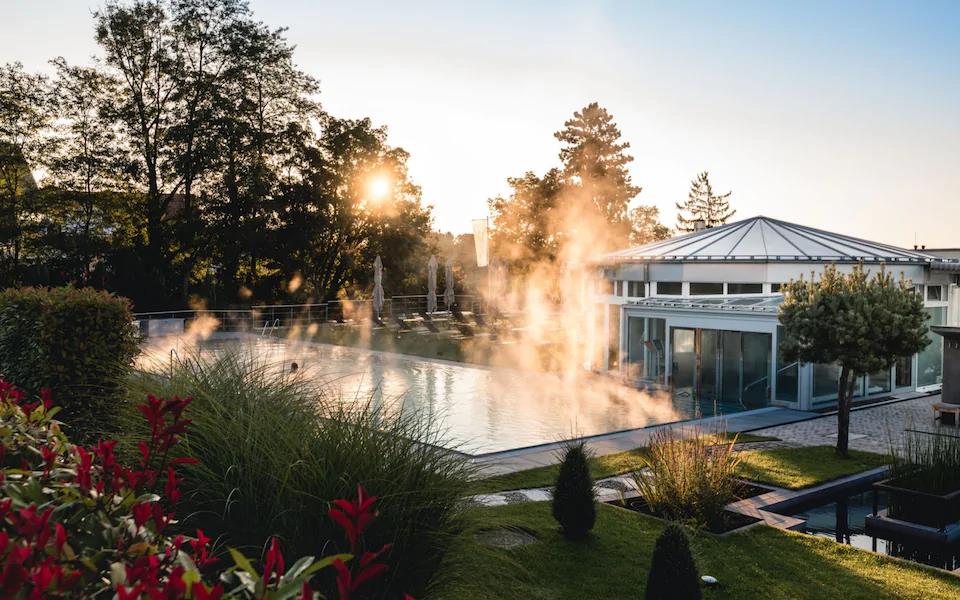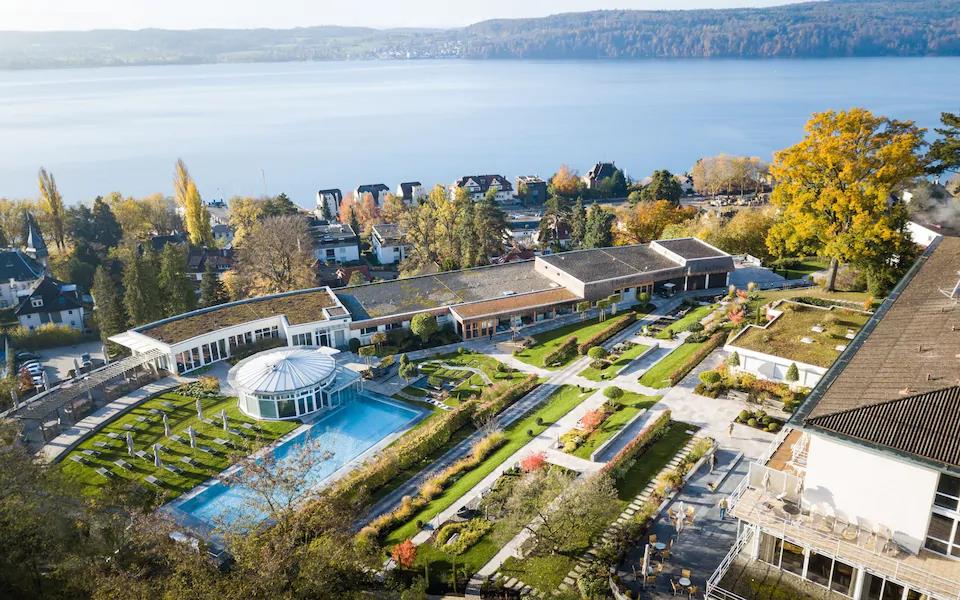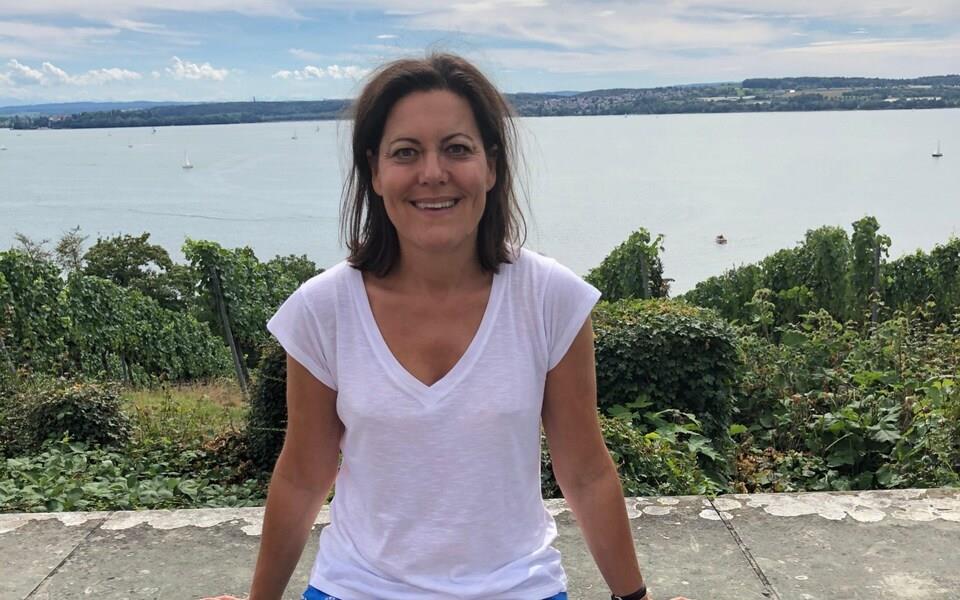

After spending two weeks at a fasting clinic, which purports to boost immunity, our sceptical writer had a change of heart
There isn’t a third person in our marriage but there is a rival. My husband is passionate about a family-run fasting clinic in Uberlingen, overlooking Lake Constance, Germany. He goes alone twice a year and was there at the beginning of lockdown. He happily remained there for six weeks unable to get home. Buchinger Wilhelmi was founded seventy years ago by Otto Buchinger, a medical officer in the navy who cured himself of paralysis caused by rheumatic fever by fasting for 19 days in 1918. Now one of the world’s leading therapeutic fasting centres, Buchinger is run by Otto’s great-grandson, Leonard Wilhelmi.
The German government demanded that the clinic remain open during lockdown, concerned that hospital over-crowding would necessitate patients being moved there. This proved unnecessary. But after Easter, having taken the requisite health and hygiene precautions, they encouraged guests. They are currently full with “a completely different clientele,” according to owner, Raimund Wilhelmi (Otto’s grandson.) “Normally, two-thirds of our guests are repeat guests. Now, fifty percent have come for the first time and they are much younger. There is a significant difference in the demographic because people are waking up to a new awareness about health as Covid affects everybody.” His son, Leonard, adds: “The medical community agree that the main causes in violent reactions to Covid are diabetes, high blood pressure and being over-weight. We have been treating these conditions for decades and our goal is now to equip people with a better immune system to fight Covid.”
The minute my husband heard about their new immune-boosting programme, he signed us up for a two weeks’ “holiday” in August. This was an extravagance at a cost of over two thousand pounds a person. “Health is our most valuable commodity,” he reassured me. After an hour in this sleek minimalist medical centre, my sixteen-year-old daughter burst into tears. All her “boarding school issues” were ignited. My inner rebel similarly baulked at the first 24 hours that we had to spend eating in our rooms, until the results of our Covid tests, taken on arrival, came through. (Thankfully they were negative or we would have been quarantined in our rooms for our entire stay.)
There was something convict-like about dining on trays in our monastically simple rooms. Thank goodness the clinic do not advise couples share rooms – 80 per cent of guests go alone – so we each had our own room. As Andrew was doing the full ten-day fast of 250 liquid calories a day, which I couldn’t stomach (I was on 800 solid calories a day and Daisy, 1800,) a shared room would have destroyed our marriage. Not because Andrew had an enema on the bed every other day but because his preternatural joy freaked us out. His pious enthusiasm for the regime initially made us hate it. Until we were fully institutionalised, (or as Daisy said “indoctrinated”) the stricture wore us out.

Anna Pasternak at the immunity hotel and fasting centre, Buchinger Wilhelmi
Every morning at 7 am you visit the nurse who weighs you, takes your temperature and your blood pressure. The nurses range from angelic to Germanic Nurse Ratcheds. Mornings are spent exercising – there are daily two hour organised hikes and a schedule of excellent exercise classes. Every morning, I escaped to Lake Constance to swim, which saved my sanity. Lunch – divine organic vegetarian food which is frankly ingenious as 800 calories seems abundant – is at midday. Then at 1 pm, the entire clinic goes to bed for a hot liver compress.
There is a collective sepulchral calm as a nurse enters your room to place a warm flannel and hot water bottle on your abdomen. You are swaddled in a thin sheet and tucked into bed. Bliss. As the liver and gall bladder busy themselves detoxifying, you sink into a grateful sleep. An hour later, another nurse brings you a pot of homemade apple tea. Then it’s more exercise – lying in the sun is frowned upon as it “creates oxidative stress,” – whereas any activity in the sunshine is encouraged as it boosts blood circulation. Supper is at 6.30 pm, then it’s early to bed. I marvelled at how long and how well I slept, averaging at least ten hours a night.
A panoply of blood tests on arrival, included in the package, revealed that my main problem was Vitamin D deficiency. A good level is 60, mine was 27. Vitamin D was prescribed and if I had needed them, Vitamin infusions of B and C would have been recommended too. The medical care here is outstanding. A lung scan was also on offer at a superior local clinic if necessary for pesky Covid symptoms.
Scientific director, Dr Francoise Wilhelmi de Toledo, explained the benefits of fasting; both full fast and intermittent fasting – where you go from 12-16 hours without eating. “When you fast, all your digestive processes are in rest. Without needing the energy to digest, all stresses are diminished and you actually need less immunity. During this time, you change your microbiome. You stimulate the lungs, skin, kidneys, liver and the
system itself triggers autophagy; an extraordinary capacity of the body to eliminate damaged cellular structures. When you fast, you activate stem cells to rejuvenate immune cells.” On a full fast, it is important that food is carefully re-introduced. The clinic insists that you stay for three days after fasting ends for “regeneration” so you don’t start over-working your body too early.
On departure, I had lost 2.5 kg, 3 cm from my waist and reduced my BMI from 23.5 to 22.7. My daughter’s teenage spots cleared up and my husband lost 7 kg. It wasn’t exactly a holiday – at varying times we all felt extreme anger, sadness and thankfully, side-splitting hilarity. Emotional detox is real. Toasting Daisy’s GCSE results with barley coffee was surreal. But we returned home on a health high. My biggest shift is that I no longer fear hunger. Dr Francoise recommends waiting an hour when you feel hungry, which I now do as a form of intermittent fasting to prolong stretches between eating. This has sustained my weight loss. My husband was right – the investment into our health and immunity has paid off.
Dr Francoise Wilhelmi de Toledo’s Guide to Boosting Immunity
- Quality and quantity of food is crucial. Eat enough quality food to stimulate a good anti-oxidant status.
- Practise fasting and intermittent fasting to lose weight.
- Avoid junk food. The sugar and cheap fat in junk food enhances metabolic stress which reduces immunity.
- Eat foods rich in Omegas 3 and 6; fatty fish, eggs, flaxseeds, walnuts.
- Oxidative stress from pollution, radiotherapy, radioactivity, drugs, pesticides etc, is counterbalanced by food rich in antioxidants.
- Eat brightly coloured food including berries, pomegranates, grapes, apricots, carrots.
- Ensure Vitamin D levels are sufficient.
- Get enough sleep; too little sleep causes high levels of cortisol in the blood which affects weight loss.
- Try and get in sync with nature’s rhythms. Early to rise, early to bed enhances immunity.
- Life events like a sudden death seriously deplete immunity. Seek bolstering emotional health support.
- While social distancing is important, some social contact is vital or immunity decreases. Loneliness lowers immunity.
- Watch your emotional balance; stop toxic mental activity like self-criticism and ruminating on the past. Meditate. Consciously breathe.
- Don’t lie too much in the sun. Exercise in the sunshine instead.
- Practise gratitude as a means to joy. Higher emotional wellbeing stimulates immunity.